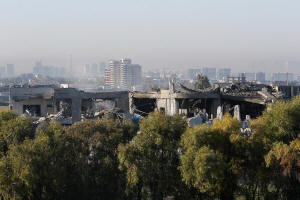Iran says Revolutionary Guards attack Israel's 'spy HQ' in Iraq, vow
more revenge
 Send a link to a friend
Send a link to a friend
 [January 16, 2024]
By Parisa Hafezi and Timour Azhari [January 16, 2024]
By Parisa Hafezi and Timour Azhari
DUBAI/BAGHDAD (Reuters) -Iran's Revolutionary Guards said they attacked
the spy headquarters of Israel in Iraq's semi-autonomous Kurdistan
region, state media reported late on Monday, while the elite force said
they also struck in Syria against the Islamic State.
The strikes come amid concerns about the escalation of a conflict that
has spread through the Middle East since the war between Israel and
Palestinian Islamist group Hamas began on Oct. 7, with Iran's allies
also entering the fray from Lebanon, Syria, Iraq and Yemen.
"In response to the recent atrocities of the Zionist regime, causing the
killing of commanders of the Guards and the Axis of Resistance ... one
of the main Mossad espionage headquarters in Iraq's Kurdistan region was
destroyed with ballistic missiles," the Guards said in a statement.
Israeli government officials could not immediately be reached for
comment.
In addition to the strikes at northeast of Kurdistan's capital Erbil in
a residential area near the U.S. consulate, the Guards said they "fired
a number of ballistic missiles in Syria and destroyed the perpetrators
of terrorist operations" in Iran, including the Islamic State.
Islamic State claimed responsibility for two explosions in Iran this
month that killed nearly 100 people and wounded scores at a memorial for
top commander Qassem Soleimani.

"We assure our nation that the Guards' offensive operations will
continue until avenging the last drops of martyrs' blood," the Guards'
statement said.
Iran had already vowed revenge for the killing of three members of the
Guards in Syria last month, including a senior Guards commander, who had
served as military advisers there.
Three security sources and Iranian state media said at the time they
were killed in an Israeli air strike. An Israeli mililtary spokesman
declined to comment, saying only it had a job to protect the security
interests of Israel.
While recalling its envoy from Tehran, Iraq summoned Iran's charge
d'affaires in Baghdad to protest against the strikes, the foreign
ministry said. It said Baghdad would take all legal measures against
what it called a violation of Iraq's sovereignty.
MILLIONAIRE AMONG DEAD
The U.S. State Department condemned the attacks near Erbil, calling them
"reckless", but officials said no U.S. facilities were targeted and
there were no U.S. casualties.
[to top of second column]
|

A view of a damaged building following missile attacks, in Erbil,
Iraq, January 16, 2024. REUTERS/Azad Lashkari

"The United States supports the sovereignty, independence, and
territorial integrity of Iraq," Adrienne Watson, spokesperson for
the White House National Security Council, said in the statement.
Iran, which supports Hamas in its war with Israel, accuses the
United States of backing what it calls Israeli crimes in Gaza. The
U.S. has said it backs Israel in its campaign but has raised
concerns about the number of Palestinian civilians killed.
Iraqi Kurdish Prime Minister Masrour Barzani condemned the attack on
Erbil as a "crime against the Kurdish people".
At least four civilians were killed and six injured in the strikes,
the Kurdistan government's security council said.
Multimillionaire Kurdish businessman Peshraw Dizayee and several
members of his family were among the dead, killed when at least one
rocket crashed into their home, Iraqi security and medical sources
said.
Dizayee, who was close to the ruling Barzani clan, owned businesses
that led major real estate projects in Kurdistan.
Additionally, one rocket had fallen on the house of a senior Kurdish
intelligence official and another on a Kurdish intelligence centre
and air traffic at Erbil airport was halted, the security sources
said.
Iran has in the past carried out strikes in Iraq's Kurdistan region,
saying the area is used as a staging ground for Iranian separatist
groups as well as agents of its arch-foe Israel.
Baghdad has tried to address Iranian concerns over separatist groups
in the region, moving to relocate some members as part of a security
agreement reached with Tehran in 2023.
(Reporting by Parisa Hafezi in Dubai and Timour Azhari in Baghdad;
Additional reporting by Phil Stewart, Idrees Ali, Jasper Ward,
Timothy Gardner, David Brunnstrom in Washington and Jana Choukeir,
Ahmed Rasheed; Writing by Timour Azhari and Parisa Hafezi; Editing
by Christopher Cushing, Matthew Lewis, Michael Perry and Alison
Williams)
[© 2024 Thomson Reuters. All rights reserved.]This material
may not be published, broadcast, rewritten or redistributed.
Thompson Reuters is solely responsible for this content.
 |